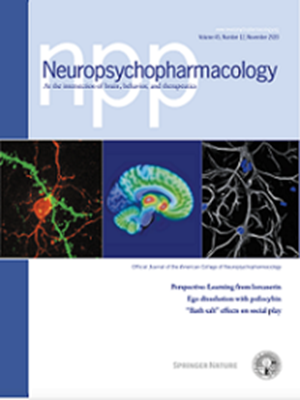Alpha-2 agonism in the locus coeruleus impairs learning driven by negative prediction error
IF 6.6
1区 医学
Q1 NEUROSCIENCES
引用次数: 0
Abstract
Refining previous learning when environmental contingencies change is a critical adaptive function. Studies have shown that systemic noradrenaline (NA) manipulations, as well as optogenetic manipulations of the locus coeruleus (LC), the primary source of forebrain NA, can improve long-term retention of appetitive extinction. To determine whether the contribution of NA is specific to extinction or extends to other forms of learning where reward is less than expected, we suppressed LC activity with clonidine, an α2A-adrenergic receptor agonist, in two tasks: compound extinction, where two previously rewarded cues are presented together and no longer rewarded, and overexpectation, where animals are presented with two previously rewarded cues but receive a single reward rather than the expected two. In compound extinction, we found no differences between groups in training, extinction, or a spontaneous recovery test. However, animals that received clonidine reacquired responding to the previously extinguished cue significantly faster than saline-treated animals, suggesting weakened extinction learning. In overexpectation testing, the saline group responded significantly less to a stimulus that had undergone overexpectation relative to a control stimulus, indicating that they had recalibrated their estimation of reward magnitude following training where reward was less than expected. In contrast, clonidine-treated animals did not differ in responding to the overexpectation versus control stimuli, suggesting that clonidine impaired learning resulting from overexpectation. These results demonstrate that activity of the LC is important for learning to reduce responding in both extinction and overexpectation paradigms.

蓝斑α -2激动作用损害负预测误差驱动的学习。
当环境偶然性发生变化时,精炼先前的学习是一项关键的适应功能。研究表明,系统的去甲肾上腺素(NA)操作以及前脑NA的主要来源蓝斑(LC)的光遗传学操作可以改善食欲消退的长期保留。为了确定NA的作用是特定于消退还是延伸到其他形式的学习,在奖励低于预期的情况下,我们用可乐定(α 2a -肾上腺素能受体激动剂)抑制了LC的活性,在两个任务中:复合消退,两个先前奖励的线索一起呈现,不再奖励,以及过度期望,动物呈现两个先前奖励的线索,但只获得一个奖励,而不是预期的两个。在复合消退中,我们发现各组之间在训练、消退或自发恢复测试方面没有差异。然而,接受可乐定治疗的动物对先前消失的线索的重新反应明显快于接受盐水治疗的动物,这表明灭绝学习能力减弱。在过度期望测试中,生理盐水组对过度期望刺激的反应明显低于对照刺激,这表明他们在奖励低于预期的训练后重新校准了他们对奖励大小的估计。相比之下,可乐定治疗的动物对过度期望和对照刺激的反应没有差异,这表明可乐定损害了过度期望导致的学习。这些结果表明,在消退和过度期望范式中,脑皮层的活动对学习减少反应都很重要。
本文章由计算机程序翻译,如有差异,请以英文原文为准。
求助全文
约1分钟内获得全文
求助全文
来源期刊

Neuropsychopharmacology
医学-精神病学
CiteScore
15.00
自引率
2.60%
发文量
240
审稿时长
2 months
期刊介绍:
Neuropsychopharmacology is a reputable international scientific journal that serves as the official publication of the American College of Neuropsychopharmacology (ACNP). The journal's primary focus is on research that enhances our knowledge of the brain and behavior, with a particular emphasis on the molecular, cellular, physiological, and psychological aspects of substances that affect the central nervous system (CNS). It also aims to identify new molecular targets for the development of future drugs.
The journal prioritizes original research reports, but it also welcomes mini-reviews and perspectives, which are often solicited by the editorial office. These types of articles provide valuable insights and syntheses of current research trends and future directions in the field of neuroscience and pharmacology.
 求助内容:
求助内容: 应助结果提醒方式:
应助结果提醒方式:


